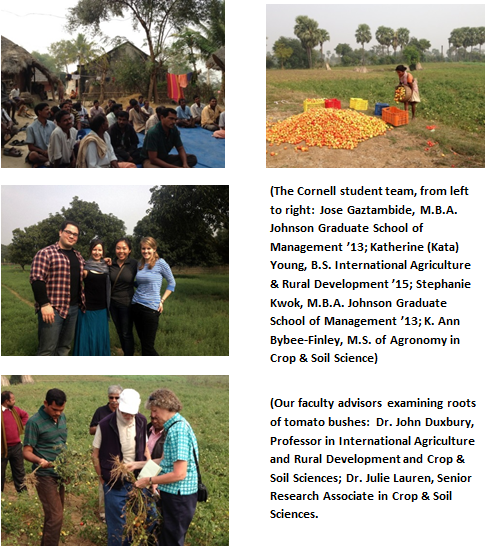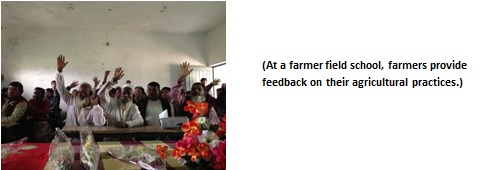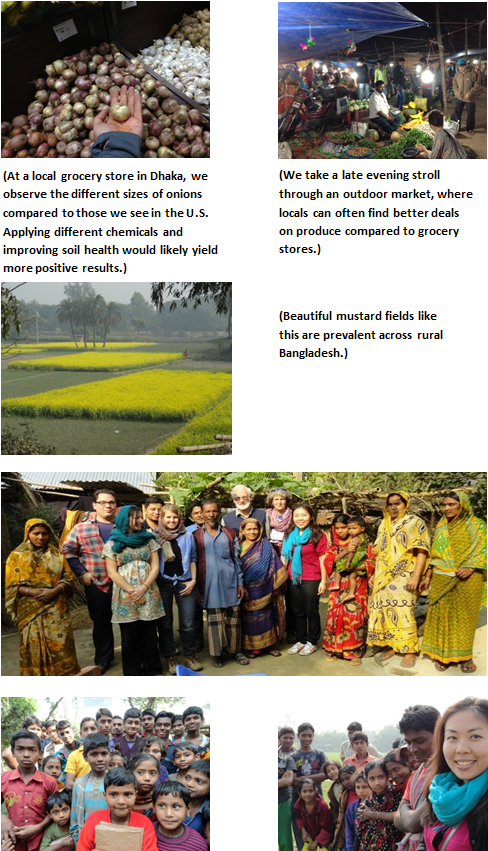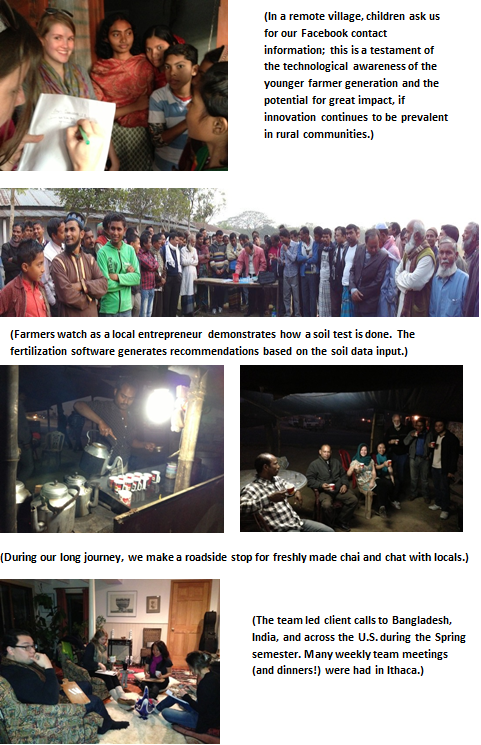Making a Lasting Impact in Bangladesh and Bringing Technology to Farmers
Students conduct on-the-ground research in Bangladesh and deliver real-world impact to rural communities.
Students conduct on-the-ground research in Bangladesh and deliver real-world impact to rural communities.

by Stephanie Kwok, MBA ’13
As part of the Johnson EMI Fellows program, each fellow completes a practicum project relating to an emerging market. This allows the fellows to dive deeper into a particular geographic area or industry by applying business skills to solve real world issues. I applied to the unique program in partnership with Cornell International Institute for Food, Agriculture & Development (the CIIFAD SMART Program) that brings together teams of students and faculty from diverse disciplines, and pairs them with organizations in developing countries. Teams spend over two weeks during Winter Break to conduct on-the-ground research in the developing country, and the entire Spring semester to consult and present final recommendations to the client organization.
Since I am very interested in the intersection of technology and emerging markets, I was excited to be selected for the rare opportunity to work with Grameen-Intel, a social business technology company formed between Intel Corporation and Grameen Trust in Bangladesh. The joint venture is based on the social business model created by Dr. Muhammad Yunus, a Nobel Peace Prize winner who founded Grameen to promote microfinancing and community development. Grameen-Intel provides technological solutions for rural entrepreneurs to deliver a service to an often under-accessed group of consumers, including farmers who have limited access to technology. I was excited to help an organization that creates digital solutions which address social problems in rural areas, such as low agricultural output and lack of pre-natal care. Our project would help scale the usage of fertilizer-recommendation software, to improve soil quality and crop production, beginning in Bangladesh and expanding globally. Agriculture comprises about 18.4% of Bangladesh’s GDP and more importantly employs nearly 50% of the country’s total labor force, with food grains primarily cultivated for subsistence. I was especially honored and humbled to work on a real-life project impacting communities whose survival depended on it.
At the beginning of this year, we traveled to the Grameen-Intel headquarters in Dhaka, Bangladesh, where we met our client counterparts and set up our temporary living headquarters. In the car ride over, I remember thinking the traffic in Dhaka was just as intense as it was in parts of India (I had been traveling on my own in India for a couple of weeks prior to starting this project). The cars in India were small and similar in size to each other, so sitting in traffic felt like riding in bumper cars at an amusement park – thrilling, but safe. A difference I observed in Dhaka traffic was that there lacked a standard size of cars. The cars, regardless of how big or small, weaved in and out of traffic which made traffic jams seem more chaotic. During the journey, my driver pointed out the characters embossed on his dashboard and remarked that he did not know what the words meant. The words were in Japanese since the car had been donated from Japan. It was at that very moment I realized the cars in the Dhaka traffic represented how Bangladesh receives support and products from around the world. It was inspiring to know that there are organizations, like Grameen-Intel, who are paving new paths for innovation – specifically for Bangladesh – and rural communities around the world.
After meeting our client counterparts in Dhaka, we traveled into India (Bhubaneswar and Kolkata) for a few days to meet with an NGO (non-governmental organization) where a successful trial of the agricultural software had been conducted. We visited local villages and farmer schools to speak with farmers and entrepreneurs about farming. We learned about the challenges and best practices of how the fertilizer software had been used with the dynamics of the agricultural ecosystem. We quickly began to understand the challenges with launching software technology and achieving wide adoption in rural communities. The farmer’s needs and the agricultural ecosystem need to be looked at holistically – critical requirements include additional business training & tools for farmers and a collaborative model for partners in the community. Wide adoption is not as easily achievable as it may be for traditional consumer web technologies where markets are more established and electronic devices are a part of everyday life. Grameen-Intel’s target customers cannot simply “plug and play” when it comes to daily functions. There are additional challenges for customers to access the technology and receive on-going support needed for effective use of the technology. Our trip to India gave us wider perspective on how to successfully launch the fertilizer software service in Bangladesh.

We then traveled back into Bangladesh to begin our several day tour of villages in Kushtia & Rajshahi where we met with local farmers, entrepreneurs, and farmer field schools. It was interesting to learn more about their practices from cultivating their crops to selling them in markets. When we asked the farmers about their understanding of soil – since soil health directly affects crop production – and soil maintenance, they answered that soil represents “life” and enables them to survive. One implementation challenge for our technology is that success depends on multiple players in the ecosystem. It was even more apparent that all players needed to have the farmer’s value at top of mind, since the farmer is the ultimate consumer of the agricultural service.

Above all, Grameen-Intel hopes to empower the entire local community by helping farmers increase crop yields and reduce fertilizer inefficiencies, while also encouraging local individuals to become entrepreneurs within their communities. The entrepreneur is a key player and distribution channel for the software service. In order for the farmer to receive the benefits from Grameen-Intel, the entrepreneur must be able to drive and sustain the business, which is why my team focused on making recommendations to the entrepreneur’s business model. There are many criteria to think about when entering a new market or region, including identifying potential partners for implementation. Potential partners and entrepreneurs need to have the same vision as Grameen-Intel, while also possessing the capacity for both agricultural and entrepreneurial development of the community.
Besides focusing on the productivity & profitability of the agriculture business, our team examined nutrition & health aspects of the farming practice and sustainable use of resources. Having a diverse team bearing different skillsets definitely proved advantageous because our agriculture teammates brought agricultural technical perspectives that helped the team complete well-rounded analysis & recommendations. We examined topics such as soil health and its components (i.e. chemical, physical, and biological properties) since comprehensive soil health is imperative to achieving optimal long-term social & ecological benefits. Imparting a holistic view of soil health also empowers farmers and entrepreneurs to make informed choices in selecting their suppliers for soil inputs. Thus, we not only helped achieve economic impact, we also delivered a social & environmental impact to the community.
Our trip was not complete without a few challenges. We encountered several hartals along our journey in Bangladesh. A “hartal” is a mass protest that can involve a total shutdown of the country. Though sometimes hartals can turn violent, they are actually recognized as a political method for expressing any political demand in Bangladesh. The experience of the hartals was more interesting, than frustrating, to me. It was fascinating to see a part of the country’s culture unfold before me. However, I could not help but wonder how hartals affect the country’s economic development. When doing business in Bangladesh, hartals are something to be familiar with so you do not get caught driving in the middle of one and also understand how they will affect your business operations. Despite the challenges, we were able to complete our journey through Bangladesh successfully.

At the end of January, our team returned to Ithaca to begin the Spring academic semester. For many, it was time to settle slowly back into Ithaca, begin new courses and catch up with classmates on Winter Break activities. Our team, however, wanted to continue the upward momentum after having so much enthusiasm coming off an inspiring trip. We divided up the remaining project workload, held each member accountable to researching topics, and met weekly for team discussions. We soon gained additional knowledge – and questions – on more topics than the project scope had originally included. Our team wrestled with prioritization of topics because of how many areas we wanted to positively impact farmers’ lives. Nonetheless, we built a thorough plan and focused recommendations on scaling the usage of Grameen-Intel’s fertilizer software. Our recommendations involved improving Grameen-Intel’s partnership selection criteria for regional expansion, identifying additional areas for entrepreneur training, adding agricultural services to the product portfolio, and building a framework & feedback retrieval model to incorporate farmer feedback in the product development process. Grameen-Intel’s Chief Executive Officer and Chief Technology Officer visited Cornell’s campus at the end of the semester, where we had the opportunity to formally present our final recommendations and engage in intimate conversations regarding the organization’s next steps. Our client executives were forthcoming with information and questions throughout the project, which demonstrated their dedication to student learning and their receptiveness to feedback on ways Grameen-Intel can further positively impact millions of lives.
Overall, the completion of my EMI Fellows program is a key highlight of my business school experience that I will continue to look back upon forever. The additional courses required to become an EMI Fellow helped prepare me for doing business abroad, specifically working in emerging markets. Through the Fellows program, I learned about markets I was previously not familiar with and how to analyze markets for their potential to become a thriving, high-impact economy. I also gained a fantastic camaraderie of globally curious classmates and faculty to discuss business news and issues in today’s global economy. Furthermore, my EMI practicum gave me valuable exposure to working with C-suite executives and setting the growth strategy for an organization, while also giving me the chance to work with amazing teammates and renowned faculty across multiple disciplines. It was an eye-opening experience to work on the ground in Bangladesh and learn about the hardworking culture of Bangladeshis. Bangladesh is a country that endures so many challenges – from its vulnerability to climate change to political unrest – but remains beautiful and full of potential for economic growth. Most of all, it was gratifying to make significant contributions to an organization dedicated to global positive change and innovation for rural communities that need them most.


